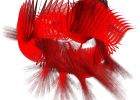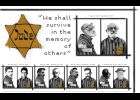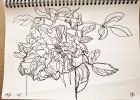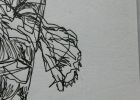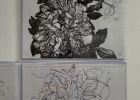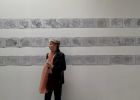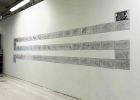Flusser Studies 40 – November 2025 / Special Twentieth Anniversary Issue
Part I: Flusser Studies 2005-2025: Pictorial Contributions
Netropolis
The pictures have been produced digitally by an algorithm that mixed, on four different levels, four photos taken on top of the tallest building overlooking the city, facing North, South, East and West. The algorithm was programmed according to a statistical rule – for instance 56% North, 34% South, 69% East and 20% West. The final image is therefore at the same time an optical condensation of the city’s appearance as well as a concentration of different information units. Najjar finds, thus, an elegant and technically creative implementation of Flusser’s concept of techno-image.
Let’s Besprechen: [On] Database Aesthetics Trial
The present remix-essay (database aesthetics from extermination formula to digital montage manifesto) is a collage-composition combining online-pictures of Flusser, Kafka, Warburg, Benjamin and Buber wearing the clothes of concentration-camp inmates. Flusser’s essay on the writer and Nobel Prize laureate Agnon calls attention to the fact that a Jew without his Jewish pride still remains “a Jew”. Judaism is an ideal model for those who do not blindly believe in models.
Part II: Changing Perspectives / New Points of View
(Un peu moins de) 20 ans avec Flusser / (A little less than) 20 years with Flusser
Nachworte zu einem Geburtstagsvortrag / Afterword to a Birthday Lecture
135b, The Desperate Hand, from X-rayish Photographs (2025)
The grids in Henry Lewis’ compositions may simply provide a skeleton on which to hang the images. However, they also reference crossword puzzles suggesting a possible meaning and may even initiate the possibility of a narrative. Grids in modern art have come to suggest non-representational spaces devoid of affect. Grids are not the result of imitation, but of aesthetic decree. Grids borrow a flat mathematical or scientific mode and yet behind every grid lurks a symbolist story. Mondrian saw religious connotations in the grid. Agnes Martin spoke of her grids as providing a quiet space for contemplation or meditation. Grids have an affinity with the idea of the horizon and the boundary between material and immaterial domains implying transcendence. A grid is a traditional and effective abstract device but it is also a powerful symbol of something quite explicit. One form of passage that these works specifically invoke is between the conscious domain and the unconscious mind. The grid may also be interpreted as a form of self-portraiture. In Lewis’ grids, there is a shadowy human presence to be made out, the entrapped presence of the artist himself.
Breathing is something all animals have to do to stay alive it is the oxygen we need and in turn the oxygen only exists because plants have preceded us ingesting carbon dioxide, absorbing the carbon to build their bodies and exhaling the oxygen that makes all animal life on earth possible. The biosphere is scarily thin and oxygen is heavy enough to stay there rather than flying off into space. Lewis has noted that the minute particles of matter from water vapour to other bodily traces that constitute the cloud of breath are captured as Photons, a substitution that is part of the indexical nature of photography and particularly at the amazing speeds when the image is caught using flash that exists for a bare 1/20,000 of a second (adapted from Anthony Bond “Of Grids and Indexes” (2024). www.henrylewis.net.au
, ( ) , On Vilém Flusser’s Idiosyncratic Use of Commas and Round Brackets
This essay explores a dimension of Vilém Flusser’s writing and thinking that has not received any attention so far: his idiosyncratic use of punctuation. Punctuation marks are more than just a way of structuring sentences. They can also be seen as gestures, as embodiments of specific mental attitudes. In this sense, Flusser’s frequent combination of round brackets included within commas articulates a fundamental tension in his thinking. These punctuation clusters are the very site where two contrary tendencies of his thinking meet and collide: the constant creative push forward and the continuous flow of the ongoing reflection, on the one hand, and the persistent urge to stray off from the main path through frequent associative eruptions on the other. It is the conflict between circles and lines, between the sprawl of tangential offshoots and the continuous attempt to impose linearity by chopping off the outgrowths, the tension between losing oneself in writing and the wish to keep in control. As Flusser calls it in “The Gesture of Writing”, it is the tenacious struggle between the ramifications of the ‛branching thought tree’ and the formal compulsion of the ‛Mesopotamian brick’. The essay also contains a detailed analysis of Flusser’s “The Gesture of Writing”, “Le geste d’écrire” and “O gesto de escrever” that shows how the use of this specific punctuation cluster evolves in the process of self-translation.
Reading Flusser: An Abecedarium
This is a memoir of the writer's reading relationship to Flusser over roughly twenty years. It represents an effort to sift through a wide variety of tangled thoughts and associations to locate those topics and approaches characteristic of Flusser that remain most promising, that is, have potential to stimulate further research or new interest. Although it does characterise Flusser's work broadly as an ongoing engagement with alphabetic writing, its history, relationships with other communicative codes, identity with history as such, conflict with other codes, it does not draw any one overall conclusion. Flusser's ongoing impact is rather seen to emerge from the distinctive way the writing engages its reader -- questioning, challenging, often persuading. Reading Flusser includes observations about the specific effects of Flusser's writing on this reader in particular, about recent research that confirms or amplifies certain pivotal ideas in the broader framework of his thought -- particularly with respect to reading and writing, and some evidence of how his thinking enters into at least one reader's perceptions of contemporary events. The abecedarium, an archaic poetic form that gathers aspects of a topic around specific words or phrases and presents them in alphabetical order, seems suited to compressing a diversity of material into an orderly form.
O último romântico: alguns apontamentos sobre a importância do romantismo alemão na formação do pensamento de Vilém Flusser
This essay is an attempt to place Vilém Flusser’s critique of the apparatus and technique within a broader context and, above all, to reflect on its roots. This approach offers an analysis of some concepts of the philosophy of the early German Romantics, specifically the Jena group, highlighting parallels in Flusser’s work: the importance of the notions of the fragment as an essential element of human thought and the cycle as its expression, demonstrating the precariousness of constructing large philosophical systems. The essay also focuses on the Romantic critique of a linear historical progress as well as on the theory of language, highlighting its poetic potential.
Vilém Flusser, Fabulador de Mundos: Ficcionalismo e Alteridade no Pensamento Flusseriano / Vilém Flusser, Fabulist of Worlds: Fictionalism and Otherness in Flusser's Thought
The epistemological program designed by Vilém Flusser assumes that scientific research needs to be fertilized by imagination. Therefore, it can be said that Flusserian philosophical fictions follow a project in which fiction constitutes a tool for the production of knowledge. This essay aims to map out the echoes of Flusser’s proposals in contemporary thinkers such as Peter Szendy and Arturo Escobar. By integrating Flusser’s reflections on design, imagination, and the perspectivistic relationship with otherness, I aim to second the Czech thinker in his search for a new way of doing theory, ultimately dedicated to the creation of new worlds and possible futures.
Vilém Flusser in Europa
This unpublished lecture reconstructs Vilém Flusser’s European impact from 1972 to 1998. It outlines the dual engagement framed by his distinction between “people of the word” and “people of the image,” beginning with the controversial, later enthusiastic embrace of his media philosophy in the German-speaking world to its scholarly analysis and the institutional establishment of his archive. The text examines Flusser’s publishing presence, his critical engagement with photographic work, and the development of his thinking towards philosophy as fiction.
The Political Crisis of the Anti-Zionist Jewish Intellectual
This text is an excerpt is from his latest book, which focuses on Vilém Flusser to illuminate intellectual Jewish history in the second half of the twentieth century, and vice versa. Flusser also featured prominently in his previous book, Photography and Jewish History: Five Twentieth Century Cases (UPENN Press, 2022). By examining five major twentieth-century case studies—from science and philanthropy to art—that intersect Jewish history and the history of photography, the book adapted Flusser’s theoretical framework to historical study to demonstrate how photography reshaped major concepts in twentieth-century Jewish history. individuals as isolated entities destined to face death in solitude. Flusser ultimately resolved his personal dilemma of place and belonging by embracing Bodenlosigkeit, locating its final form within the realm of aesthetics. His sharp rejection of a grounded politics stood in stark contrast to Zionism, which asserted Boden (ground/land) was a prerequisite for political life. It also diverged fundamentally from Heidegger's philosophy, which linked the "right way" to Boden but was an impossible alternative for Flusser, who viewed Nazism as a biological-technological program. Flusser’s philosophy, which notably lacks concepts such as political life, citizenship, or the state, exposes a profound political crisis in the post-Holocaust condition. His anti-nationalism and anti-Zionism stemmed from a general rejection of nationalism as a false striving for security and a specific conviction that Zionism contradicted his ideal of Judaism. While structurally echoing pre-1918 anti-Zionist thought, Flusser's views diverged from the post-1948 Jewish intellectual mainstream, ultimately offering a distinctive, marginal perspective on the evolving history of Jewish opposition to Zionism.
Entre a Memória e o Abismo: regimes de hipermemória, datificação e a arte como desprogramação na cultura de dados /Between Memory and the Abyss: Hypermemory Regimes, Datification and Art as Deprogramming in Digital Culture
This essay investigates transformations of memory in the context of digital culture, datafication, and algorithmic control, proposing the notion of a hypermemory regime to describe the contemporary reconfiguration of how memory is produced, stored, and monetised. Structured in three interconnected parts, the text begins by critically examining how memory has become a strategic field of dispute in the age of surveillance capitalism. Through the commodification of data and algorithmic governance, memory is no longer merely a human or cultural attribute—it is now central to new systems of power and behavioural control. In the second part, the essay turns to Vilém Flusser’s philosophical contributions—especially the texts Ars Memoria, Vampyroteuthis Infernalis, and Filosofia da Caixa Preta [Towards a Philosophy of Photography]—to rethink the technical, symbolic, and ideological dimensions of memory. Flusser’s reflections anticipate many of today’s central concerns and offer critical tools for understanding the mediating role of artificial memories. Finally, the third part explores how art, through gestures of deprogramming, can act as a space of resistance within the hypermemory regime. For Flusser, to remember is not only to preserve but also to invent—to reopen experience to imagination, criticism, and freedom.
Revisiting ‘the Problem of the Devil’…
In 1965, when Flusser’s A História do Diabo [The History of the Devil] was first published, Vilém Flusser claimed the book was his effort to come to terms with ethics. To many readers, though, both now and then, the book seems to be less about ethics than about death. This is what I call ‘the problem of the devil’. In what follows, I try to come up with a few explanations why we ought to return to the book of the devil and verify what we have taken for granted.
A Cartogram of Vilém Flusser’s Nomadism
This contribution presents a cartogram, a map that is altered so that the surface area of geographic entities are proportional to another kind of value. Developed by Clemens Jahn and Daniel Irrgang for the exhibition “Bodenlos – Vilém Flusser and the Arts” at ZKM Karlsruhe (2015) and the Academy of Arts Berlin (2015/16), it visualizes Vilém Flusser’s nomadism, a complex interplay of experiences of displacement and intersubjective connection. While the cartogram was initially disseminated within the exhibition context, it has not been widely published until now, making this special issue of Flusser Studies an opportunity for broader engagement. The publication is accompanied by an introduction written for this issue, which contextualizes the cartogram within Flusser’s biographical narrative and highlights its relevance in examining the ongoing issues of displacement and uprootedness in society.
Flusser on Artificial Intelligence
This article unfolds along five thematic constellations where Flusser’s thought enters dialogue with contemporary developments in artificial intelligence. It begins by contrasting his conception of the apparatus with Alan Turing’s model of simulation. It then turns to Flusser’s notion of variational creation and its relevance to the generative logic of AI systems. The third section engages with his idea of the black box (a system accessible at only two points, input and output) in relation to the opacity of machine learning models. The fourth addresses the epistemological problem of learning from scratch, drawing on experimental research by Gašper Beguš. The final section reflects on mediated communication across species, bringing together Vampyroteuthis infernalis and recent AI-based studies of whale vocalization. Together, these reflections offer a philosophical framework for thinking through the epistemic, technical, and ethical stakes of AI—one that resists both anthropocentric assumptions and computational reductionism.
Phenomenological crossroads between Husserl and Flusser. Toward a Phenomenology of the Image in the post-digital age of AI
This article examines the phenomenological relationship between Edmund Husserl’s foundational ideas on intentionality, perception, and consciousness, and Vilém Flusser’s media-philosophical critique of technical images. While Husserl laid the groundwork for understanding consciousness as always directed toward objects through intentional acts, Flusser extended this logic to consider how new media—specifically technical images—restructure the horizon of intentional experience. Through a comparative reading, we argue that Flusser offers a post-phenomenological extension of Husserlian thought, addressing the historical evolution of appearance and its mediation through apparatuses. By situating technical images within the lifeworld (Lebenswelt), the article shows how Flusser’s theory can be understood as a phenomenology of post-industrial perception, where the image no longer reveals the world, but instead simulates it, altering the structure of intentionality itself. Ultimately, we propose a synthesis that sees Flusser’s technical image not merely as a cultural artifact but as a new noematic layer within phenomenological experience, calling for a reconsideration of subjectivity and meaning in the digital age.
After Technical Images: Towards a Theory of Post-Technical Imaging
While Flusser’s concept of technical images remains foundational for understanding modern image-making, its limitations become evident when applied to emerging visual culture, which operates beyond immediate human sensory capabilities and constraints of previous apparatus. This essay proposes the concept of corporeal imaging as an alternative system that classifies imaging as relational to the body. This taxonomy enables the incorporation of contemporary imaging practices such as networked astronomical observations and generative AI systems that supersede traditional single-body relations. These developments necessitate new theoretical approaches for understanding image making beyond technical imaging.
From Sound to Sign: Writing as Worldmaking in Vilém Flusser and Walter J. Ong
Writing changes the world. Or so thought scholars Vilém Flusser and Walter J. Ong in the second half of the 20th century. This paper explores the ontological and epistemological consequences of the written word according to the complementary views of these two authors. The pre-eminence of language for the constitution of reality was a stance assumed by Vilém Flusser already in his first book (1963) and later developed throughout his career. In his view, linear thought as we know it now became possible as a result of the technology of writing. Flusser’s reading deeply resonates with the Ong’s study of the transition from oral to literate cultures, as the latter posits that the written record allowed for a reformulation of thinking itself, an opening of the possibilities we know today. Although they wrote in different contexts, the questions they tackle and the conclusions they reach have profound similarities. For comparison, this study relies mainly on ideas found mainly in two seminal publications: Língua e Realidade [Language and Reality] by Vilém Flusser, and Orality and Literacy: the technologizing of the word, by Walter J. Ong.
Flusser e o Design Por Trás de Todos os Valores
This article proposes a philosophical reading of the notion of design in the work of Vilém Flusser, highlighting his critique of the modern separation between art and technique. Far from defining design as a stable or professional disciplinary field, Flusser understands it as a way of thinking that highlights the artificiality of the world and destabilizes the claims of objectivity in Western epistemology. Instead of asking what design is, the author invites us to inquire how it materializes and leads us to act. Design, then, rather than just a project, becomes a device capable of trickery, a practice of symbolic, ethical, and political creation that transforms the world into a fictional surface that is continuously (re)designed.
El extraño señor llamado Vilém F.
This essay is a reflection from various perspectives on the life and work of Vilém Flusser. Structured as a series of scenes, it connects biographical and geographical reflections, ranging from his escape from Prague, his residence in Brazil, and his return to the city of his birth, with considerations on the peculiar structure and reception of his work, marked by its thematic and disciplinary heterogeneity. Through these scenes, the figure of a nomadic thinker, “groundless” (bodenlos) emerges, one who evades closed systems, inherited traditions of thought, and stable foundations. His life and work are permeated by displacement, discomfort, and constant challenge. Each section emphasizes a different aspect: his relationship with art and design, the playful character of his writing, his polyglot practice and its influence on his creative process, and his way of thinking about technology in dialogue with phenomenology, cybernetics, and philosophy. The aim is not to fix Flusser into a single definitive category as writer or philosopher, but to demystify him, placing him as a man of our present, highlighting his condition as a radical contemporary capable of reading our time as a Heraclitean flow, turbulent and labyrinthine.





